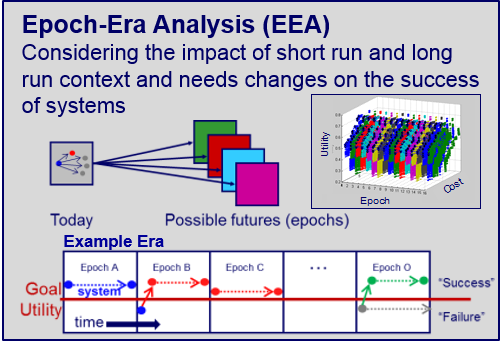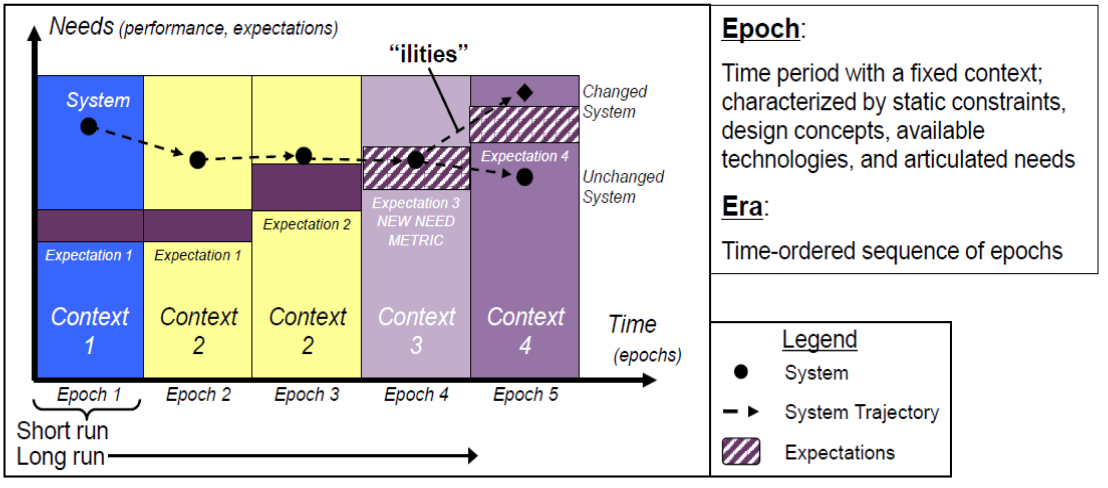Epoch-Era Analysis (EEA)
back to projects
 EEA for short run and long run computational scenario planning
EEA for short run and long run computational scenario planning
Epoch-Era Analysis (EEA) is a framework designed to clarify the effects of changing contexts over time on the perceived value of a system in a structured way. The base unit of time in EEA is the epoch, which is defined as a time period of fixed needs and context in which the system exists. Epochs are represented using a set of epoch variables, which can be continuous or discrete values. These variables can be used to represent any exogenous uncertainty that might have an effect on the usage and perceived value of the system; weather conditions, political scenarios, financial situations, operational plans, and the availability of other technologies are all potential epoch variables. Appropriate epoch variables for an analysis include key (i.e., impactful) exogenous uncertainty factors that will affect the perceived success of the system.
 Storyboarding system trajectories across epochs and eras
Storyboarding system trajectories across epochs and eras
A large set of epochs, differentiated using different enumerated levels of these variables, can then be assembled into eras, ordered sequences of epochs creating a description of a potential progression of contexts and needs over time. This approach provides an intuitive basis upon which to perform analysis of value delivery over time for systems under the effects of changing circumstances and operating conditions, an important step to take when evaluating large-scale engineering systems with long lifecycles. Encapsulating potential short run uncertainty (i.e., what epoch will my system experience next?) and long run uncertainty (i.e. what potential sequences of epochs will my system experience in the future?) allows analysts and decision makers to develop dynamic strategies that can enable resilient systems.
 Key activities within EEA
Key activities within EEA
Related Files
Rader, A.A., Ross, A.M., and Fitzgerald, M.E., "Multi-Epoch Analysis of a Satellite Constellation to Identify Value Robust Deployment across Uncertain Futures," AIAA Space 2014, San Diego, CA, August 2014. [paper] [briefing]
Pina, A.L., Applying Epoch-Era Analysis for Homeowner Selection of Distributed Generation Power Systems, Master of Science in Engineering and Management, System Design and Management Program, MIT, June 2014. [pdf]
Schaffner, M.A., Designing Systems for Many Possible Futures: The RSC-based Method for Affordable Concept Selection (RMACS), with Multi-Era Analysis, Master of Science Thesis, Aeronautics and Astronautics, MIT, June 2014. [pdf]
Beesemyer, J.C., Ross, A.M., and Rhodes, D.H., "Case Studies of Historical Epoch Shifts: Impacts on Space Systems and their Responses," AIAA Space 2012, Pasadena, CA, September 2012. [paper] [briefing]
Gaspar, H., Erikstad, S.O., and Ross, A.M., "Handling Temporal Complexity in the Design of Non-Transport Ships Using Epoch-Era Analysis," Transactions RINA, Vol. 154, Part A3, International Journal of Maritime Engineering, Jul-Sep 2012, pp. A109-A120. [paper]
Fitzgerald, M.E. and Ross, A.M., "Mitigating Contextual Uncertainties with Valuable Changeability Analysis in the Multi-Epoch Domain," 6th Annual IEEE Systems Conference, Vancouver, Canada, March 2012. [paper] [briefing]
Fitzgerald, M.E. and Ross, A.M., "Sustaining Lifecycle Value: Valuable Changeability Analysis with Era Simulation," 6th Annual IEEE Systems Conference, Vancouver, Canada, March 2012. [paper] [briefing] **TOP FIVE PAPER**
Ross, A.M., and Rhodes, D.H., "Epoch-based Thinking: Anticipating System and Enterprise Strategies for Dynamic Futures," MIT PI Short Course SC-2010-PI26s, July 2010. [course]
Ross, A.M., and Rhodes, D.H., "Using Natural Value-centric Time Scales for Conceptualizing System Timelines through Epoch-Era Analysis," INCOSE International Symposium 2008, Utrecht, the Netherlands, June 2008. [paper] [briefing] **BEST PAPER AWARD**






